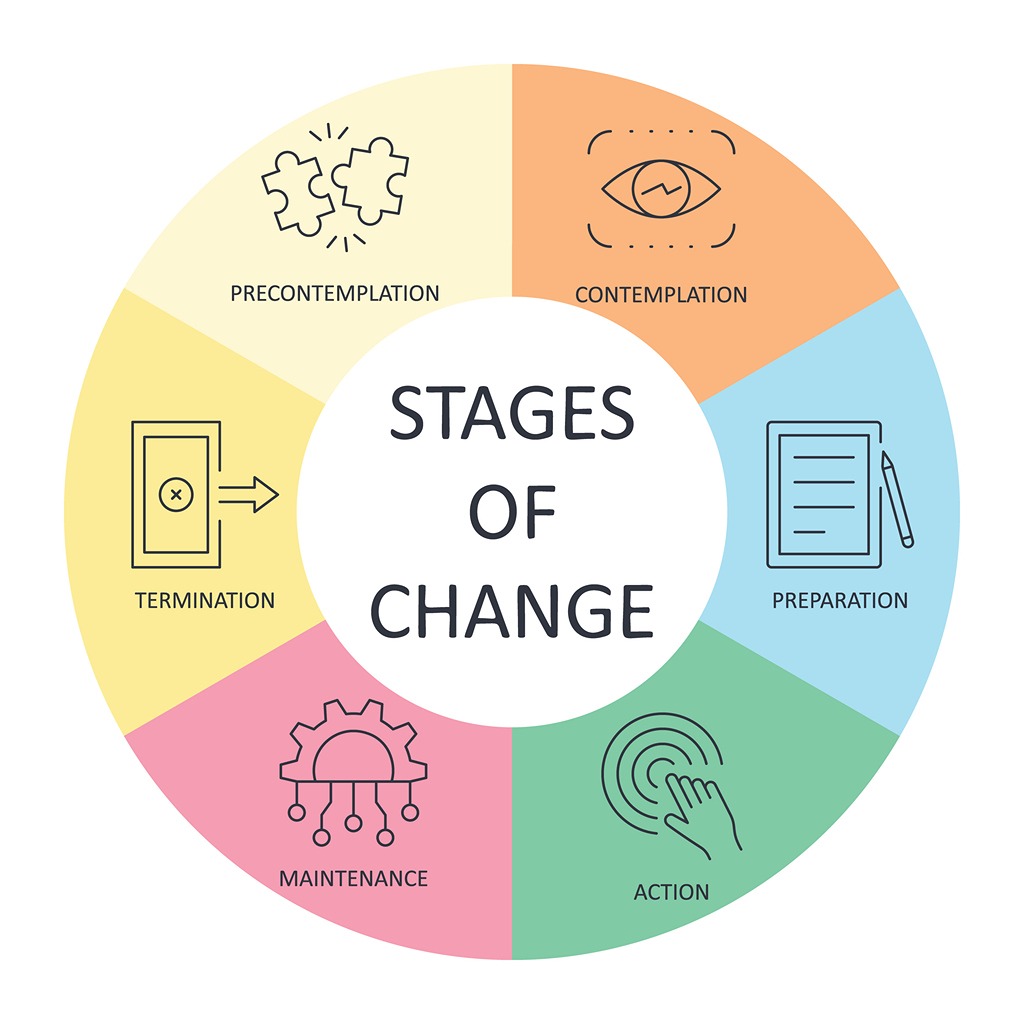New Year's resolutions and self-improvement - by Katy Stuart, RD

It's January now, 2025. How did that happen? It's the time of year when we make our New Year’s resolutions. I'm not a fan of making New Year’s resolutions, as I don't see the point, probably because, like many people, I've made resolutions before and haven't kept them! As a healthcare professional though, I am keen on helping people make healthy changes, which often starts as a ‘New Year’s resolution.’(1)
I am also interested in behaviour change and understanding the psychology behind successful behaviour change. As a renal dietitian, I provide a lot of nutrition counselling and encourage my patients to make healthy changes to their diet to improve their health and well-being. Some of my patients, though, continue to struggle with this despite my best efforts to advise and support them.
Research around New Year’s resolutions has shown that 90% of people fail to complete their resolutions, around 25% have quit by the end of the first week and 80% by February.(2,3) So, by the time you read this, you may have already given up on one or two of your resolutions.
So, why are we likely to give up on them? Well, there are many reasons for this... (3,4,8)
Shame-based motivation. Shame is a strong predictor of motivation to change. If we are ashamed of an aspect of ourselves, we desire to improve ourselves. However, shame is a negative emotion brought about by fear, force, pressure or punishment. The benefits of change are not clear in this situation, so the motivation to change is likely not going to last.
Tradition versus motivation. New Year’s resolutions are a tradition so we feel we ‘should’ make them every year as we have always done before. However, this does not mean you are motivated to make lasting changes, and peer pressure and guilt are not good reasons to change ourselves.
Creating daunting resolutions. It is very common to overreach with New Year’s resolutions. What we desire is sometimes not realistic in the timeframe we want it to happen.
Not planning for obstacles. Change is not easy and takes commitment, patience and support. Life is unpredictable and there will be times when we don't feel able to continue with the healthy changes we are making, eg, healthy eating, weight loss, quitting smoking or quitting alcohol. That doesn't mean we have to give up, but we may need to pause and work through the problems one at a time.
Not having a good action plan. As above, planning is key. A robust plan with a roadmap of where you want to go and how you will get there is important.
Not having a supportive environment. Making changes alone is difficult. With no encouragement and validation, making healthy changes alone can be disheartening. Support from family and friends and healthcare professionals plays a huge part in successful change.
A lack of information and knowledge. This can make it difficult to change behaviour, eg, not knowing what a healthy diet consists of or the best options for nicotine replacement therapy.
A lack of skills, such as how to cook and prepare meals or how to exercise healthily, can reduce our motivation fairly quickly.
Lack self-efficacy, which is confidence in one's ability to perform the behaviour, is a barrier to making successful healthy behaviour changes.
The transtheoretical model of behaviour change

In order to counsel our patients, it is useful to understand the theories of behaviour change. One of the most frequently occurring behaviour change models in use is known as ‘the transtheoretical model’ developed by Prochaska and DiClemente in the late 1970s. The model uses the six stages of behaviour change: (9)
Precontemplation. The individual does not intend to change their behaviour. This may be due to previous failed attempts or lack of confidence.
Contemplation. The individual decides to change their behaviour in the next few months but they are weighing up the challenges and risks versus benefits.
Preparation. The individual starts planning for the change they are going to make and what resources they may need.
Action. The individual starts making significant changes that will lead to improvement in their health and well-being.
Maintenance. The individual maintains the changes without relapse but perhaps is not putting in as much time and effort as during the action stage. Relapse can occur at any time and then the individual will return to the contemplation or precontemplation stages.
Termination. The individual has successfully continued the changes long term and has not been tempted to relapse to their old behaviours. They are feeling the benefits of healthy changes in their life. This, of course, is the stage that many are unable to reach and then find themselves returning to previous stages and possibly going through the stages more than once. (9)
Supporting successful behaviour change
I recommend the following options for supporting successful behaviour change:(2,4-7)
Be realistic about your goals. The results you are seeking may take some time to achieve. Relapse is to be expected but is not failure. People move through the steps of behaviour change many times before change is permanent and the benefits are felt.
Ensure your goals are healthy and suitable for your abilities without harming your physical or mental health.
Set up a supportive environment with family and friends, contacts with healthcare colleagues and online support groups.
Develop a robust action plan with specific achievable goals.
Create a timeline and understand that your timeline should not be compared with anyone else’s. It is your journey and you decide what steps to take, how and when.
It is easier and less daunting to break it down into small, incremental goals instead of extreme changes all at once.
Monitor your progress. It is a good idea to keep a written record such as a journal and have support with accountability from family, friends and healthcare colleagues. Documenting your feelings and what obstacles you need to overcome helps to guide you along the journey.
Flexibiity is needed. Life happens and there may be times when you need to change your action plans and timeline to incorporate this.
Find activities that make you happy and inspire creativity which will encourage your motivation and mental well-being.
END NOTE
Taking small steps to improve your health and well-being is always worth it, so whatever ‘New Year’s resolution you have made or are about to make for 2025, I wish you the best of luck!

Katy has 20 years of experience in both acute nutrition support and renal dietetics. she is now a full-time Renal Dietitian at Pilgrim Hospital,
Boston, Lincs.
Katy Stuart, RD, Renal Dietitian
References
Mental Health Foundation, ‘Set a Theme For Yourself This New Year, 2021’
https://www.mentalhealth.org.uk/explore-mental-health/blogs/set-theme-yourself-new-year
Centerstone, ‘How New Year's resolutions impact your mental health’, Martha Bowman
Mental Health UK, ‘New Year, New Me? Why New Year’s resolutions can be unhelpful, and how to set healthy goals’, 2024
National Council For Wellbeing, ‘Realistic New Year’s Resolutions for Your Mental Health’, 2020
https://www.mentalhealthfirstaid.org/2020/01/realistic-new-years-resolutions-for-your-mental-health/
NIH News In Health, ‘Making Your Resolutions Stick How to Create Healthy Habits,’ 2010 https://newsinhealth.nih.gov/2010/12/making-your-resolutions-stick
Heart.org, ‘To make healthy New Year's resolutions stick, keep them modest and manageable’ By Michael Precker
Psychology Today, ‘Shame and Motivation to Change’ by Lisa Rivero, 2015
https://www.psychologytoday.com/gb/blog/creative-synthesis/201501/shame-and-motivation-to-change
Hone, ‘Behaviour Change’
Positive Psychology, ‘What Is Behavior Change in Psychology? 5 Models and Theories’ by Nicole Celestine, 2021
https://positivepsychology.com/behaviorlants, 10, 2487

Comments